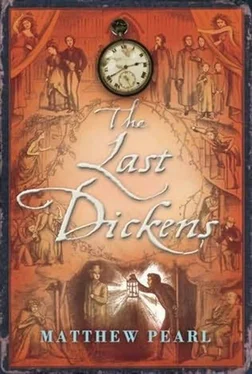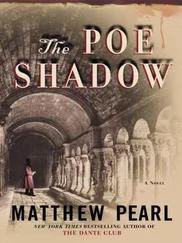“You are fortunate Mr. Fields has as much political influence as he does, and that he chose to use it in your favor, Mr. Branagan,” Osgood chimed in.
Dolby went on listing his grievances. “You accost a lady-a blue-blood lady of society-at the theater, cause a commotion, and draw attention away from the grand success of Mr. Dickens. And, if it were not bad enough, all on Christmas Eve! The Chief has enough of a burden right now with his influenza and being away from his family during the holiday season. And what will the press make of it if they get ahold of it!”
“Your thoughtless actions have risked tainting the entire reading tour to the public eye, Mr. Branagan,” Osgood said. “The future reputation of our publishing house is at stake.”
Tom shook his head. “That woman is a danger. I know it in my heart and my bones. She should not have been released, and we must urge the police to locate her!”
“A woman,” Dolby cried. “You want Charles Dickens to look like he is afraid of a woman! That woman , by the by, is named Louisa Parr Barton-her husband is a renowned diplomat and great scholar of European history. She comes from an American branch of the Lock-ley family of Bath.”
“Does that prove she is sane or well-meaning?” Tom asked.
“You're right,” Osgood replied. “Understand, Mr. Branagan-Mrs. Barton is known for her eccentricities and is unwelcome in many homes of society in Boston and New York owing to her strange behavior. Mr. Barton, it is said by some, married her chiefly for the connection to her family name, and she never could master housekeeping or be a proper mistress to her servants. Others say Barton was passionately in love with her. Whatever the truth, he spends most of the time traveling. It is rumored he would have received the appointment as our ambassador in London if not for her behavior. Ever since she slapped the Prince of Wales in the face upon being introduced to him, she is forbidden from joining Mr. Barton's trips.”
“That is why she is able to do as she pleases here,” Tom said.
Osgood nodded. “With her husband away, she is alone and free with her strange habits and money. She is harmless.”
“She struck an old woman at the Westminster Hotel!” Tom said.
“We cannot prove that. Don't you see what thin ground you stand on, Branagan?” Dolby replied. “What compelled you?”
“Perhaps I speak above my position, but I've acted on my instinct,” Tom replied.
Dolby shook his head again. “You speak and you acted above your position, Branagan. The Boston police hadn't any choice but to let her go.”
“What about the fact that she broke into Mr. Dickens's room, Mr. Dolby?”
“Well, what if it was her, Branagan? We may box her ears, have the police court fine her but not jail her, as she never threatened the Chief nor took any of his belongings. Save a hotel pillow, for which the most severe magistrate would order this Boston Brahmin to pay a dollar!”
“I think she might have been the one to take the Chief's pocket diary,” Tom said.
“And your evidence?” Dolby asked, pausing for an answer that didn't come. “Thought not. What would she want with an old diary, anyway?”
“To learn private details,” Tom persisted. “Mr. Dolby, I am only trying to see to the protection of the Chief.”
“Who asked you to do so?” Dolby asked.
“You instructed me to serve him,” Tom answered.
“Well, you've taken it too far,” Dolby said. “And you won't do it any longer.”
Osgood, taking a long drink of punch, shook his head sadly and added a comment with a thoughtful air. “You say you act upon instinct. Men like Mr. Dolby and myself act upon what is right and proper, what is within the rules. What is safe for people who put their trust in us. If we could, Mr. Branagan, we would be tempted to send you back to England. But that would bring attention in the newspapers.”
“Instead,” Dolby broke in with the voice of a disciplining father, “you are from this point on to act strictly a porter, as you were hired. You are to stay in the hotel, unless instructed otherwise, and carry out chores when asked. When we've returned to Ross, I shall decide on your future-if I hadn't paid three guineas for your livery, I'd give you walking papers now.”
Tom, deflating, gazed at the marble fireplace. “And the Chief? Does he agree with this?”
“Pray worry about your own condition! The Chief will be just fine under our care, thank you, Mr. Branagan,” Dolby said haughtily.
“Indeed,” Osgood added. “We'll make sure Mr. Dickens is busy enough while we finish dealing with the authorities, so there is no more attention paid to your fears. In fact, I have already recruited Oliver Wendell Holmes to show him the sights of Boston. If anyone can numb a man into distraction, it is Dr. Holmes.”

AFTER DOLBY WALKED Osgood out, he was stopped back in front of his door by a waiter.
“Mr. Dolby? There is a gentleman downstairs to see you-urgent business.”
“It's ten o'clock at night on Christmas Eve,” Dolby remarked, taking his watch from his coat. “Ten and a half, actually, and I have been running about the city tending to business since six this morning. Did the caller send up a card?”
“No, sir. He said the words very urgent , though. I should say from the way he looked that he was indeed urgent.”
Urgency indeed. It was probably another stranger who needed tickets to sold out readings for his blind, deaf, and mute sisters and aunts and wives. “Very important American writers,” whose names Dolby and Osgood had never heard before, wrote pleading for a single free pass, front row, to properly honor Dickens's visit to their city, plus five more for their friends, if you please.
Downstairs at the bar, Dolby searched the faces for his mystery caller. One man stood out. His arms stiffly folded across his chest. A fat, boyish face, but grizzled with scars and gray columns in his beard. He was short but had a robust, qualifying as stocky, build with an imposing presence. The man waved to Dolby.
“I'm afraid, my friend,” Dolby began an amiable but aloof speech, “our tickets for the next readings have been sold already. You may try again for the next series which we have added to accommodate more hearers.”
The man passed him a pile of documents and a badge.
“I'm not looking for tickets, Mr. Dolby. Or… not unless I must confiscate them along with every piece of property in your possession.” He smiled humorlessly.
Dolby examined the documents. Income-tax papers. The badge gave the name of Simon Pennock, tax collector.
“I understand you have been seen with paper bags piled with greenbacks from your ticket sales, Mr. Dolby,” Pennock said in the same tone he might have chosen if the bags had been human bones. The tax collector's chair was in front of a anthracite coal fire, which outlined the man in a disturbing haze of dark blue that served to distress Dolby further.
“Mr. Pennock, it is my understanding of your country's law that ‘occasional lectures’-that is the language in the act of Congress-by foreigners on your soil are exempt from taxation.”
“You've misunderstood the law. Not that it's my duty to explain it. You should begin payments to me from your proceeds now, Dolby, five percent precisely, to avoid more unpleasant business than you've had.”
“I assure you we haven't had any unpleasant business, sir.”
Pennock stared hard. “You are having it right now, Mr. Dolby.”
Dolby looked around the barroom as though he would find help. Instead, he saw a man who was in a sealskin cap and peacoat, the unbuttoned coat revealing the corner of another Treasury Department badge. Dolby did not like the idea that he had been watched by these men taking in his money from the ticket offices, and most of all he hated that he was outnumbered. He wished Tom were there with him, at least. Not that Dolby thought that government agents would attack him, yet with Tom, younger and sturdier, he thought he would have mustered more self-confidence.
Читать дальше













